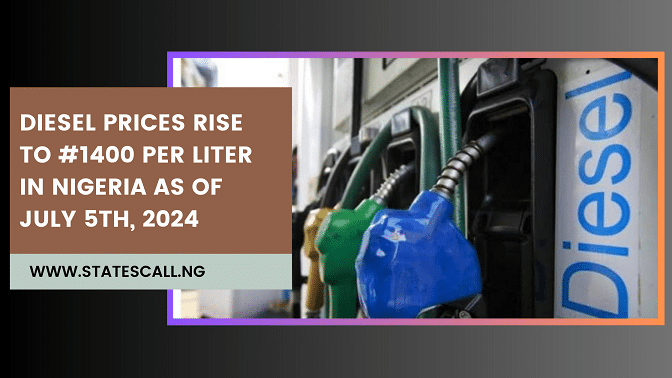This post may contain affiliate links. Read our disclosure policy.
In a pivotal development impacting Nigeria's economy, diesel prices have soared to unprecedented heights, reaching #1400 per liter effective July 1st, 2024. This dramatic increase has sparked widespread concern among consumers, businesses, and policymakers alike.
Understanding the reasons behind this surge is crucial for navigating its implications on various sectors of the economy. This article gives an insight into the factors contributing to the sharp rise in diesel costs, examines the potential consequences for businesses and consumers, and explores what the future may hold in this challenging economic landscape.
Diesel Prices Rise to #1400 Per Liter in Nigeria

The average retail price of Automotive Gas Oil (Diesel) paid by consumers increased by 50.20% on a year-on-year basis from a lower cost of N836.91 per litre recorded in the corresponding month of last year (i.e., February 2023) to a higher cost of N1,257.06 per litre in February 2024.
On a month-on-month basis, an increase of 9.02% was recorded from N1,153.01 in the preceding month of January 2024 to an average of N1,257.06 in February 2024. Looking at the variations in the States' prices, the top three States with the highest average price of the product in June 2024 include Akwa Ibom State (N1,550.00), Gombe State (N1,500.00) and Kwara (N1,444.00).
Furthermore, the top three lowest prices were recorded in the following State namely, Adamawa State (N1,037.50), Kano State (N1,111.43), and Katsina State (N1,125.00). The Zonal representation of the average price of Automotive Gas Oil (Diesel) shows that the South South Zone has the highest price of N1,556.09 while the South West Zone has the lowest price of N1,164.05 when compared with other Zones.
The cost of Nigeria’s Automotive Gas Oil (Diesel) has remained at N1,400 to N1700 per litre since 2024, as opposed to the price of N700 per litre. Consumers paid 59.51% more on average for Automotive Gas Oil (Diesel) in March 2024 than they did the previous year. The price per litre rose from N840.81 in March 2023 to N1550 as of June 2024.
In a recent meeting with the Nigerian Association of Road Transport Owners (NARTO), Farouk Ahmed, the Chief Executive of the Midstream and Downstream Petroleum Regulatory Authority (NMDPRA), disclosed that the regulator would not enforce freight price increases. Ahmed explained that they had previously raised the freight prices in 2022 when the diesel price was N700 per litre, but it is now N1400.
As a result, the regulator stated that they would not enforce pegging price increases and instead urged NARTO to negotiate with the marketers. This caused some reluctance from the marketers, which resulted in NARTO downing tools.
However, an agreement was reached between NARTO and marketers, and NARTO called off its planned nationwide strike. Othman Yusuf, the National President of NARTO, stated that the agitation is strictly on freight rate, and going forward, they would continue to engage with the marketing companies based on economic realities.
Numerous Nigerian companies are trapped in a dilemma due to the escalating cost of diesel, which has forced them to choose between rationing resources and shutting down operations. The price of diesel has surpassed N1,700 per litre, rendering a devastating blow to Nigerian businesses, which are already struggling with prolonged power outages, according to Business Day’s research.
Diesel prices have surged for several reasons, including the rising global crude prices, infrastructure constraints, distribution inefficiencies, and regulatory bottlenecks affecting domestic refining capacity, leading to a significant reliance on imported diesel.
Furthermore, due to the devaluation of the naira against the dollar, it now takes more local currency to buy the same amount of fuel, which has further exacerbated the situation. Consequently, marketers have requested that the industry shift away from the dollar as a transaction medium in the supply chain due to the complexity of the foreign exchange market uncertainty.
To ease the burden of fuel subsidy removal and control the escalating cost of living, the government suspended 7.5% VAT on diesel for six months last year. The VAT exemption came to an end on March 31, 2024, and the authorities have not announced future measures.
In April 2024, the Dangote Petroleum Refinery announced a reduction in the price of diesel from N1,200 to N1,000 per liter, and later to N940 per liter, to help with Nigeria’s domestic economy but no independent and long-term market viability analysis has been done. Dangote Refinery recently commenced distribution of AGO to fuel marketers across Nigeria, intending to eradicate the country’s reliance on AGO importation.
The Takeaway
In conclusion, the diesel price rise to ₦1400 per liter marks a critical juncture for Nigeria's economy and its citizens. This surge underscores the need for sustainable energy policies and effective economic strategies to mitigate such drastic fluctuations in the future.
As the country navigates these challenges, staying informed and adaptable will be key for both individuals and businesses. By keeping a close watch on these developments, Nigerians can better prepare for the impacts and explore alternative solutions to manage their energy needs efficiently.


